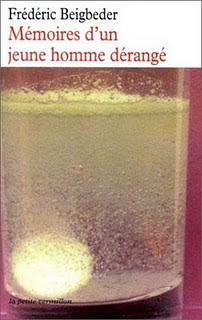Frédéric Beigbeder's Vacances dans le coma is his second novel, and I think the best thing about it is the one-and-a-half page Foreword, which he also calls a self-criticism. He considers this his 'best' novel, although he had at the time only published one other, which is called Mémoire d'un jeune homme dérangé (you see the ambition of the comparison with Beauvoir's account of her early life?).
Beigbeder says that he thought of Huis clos and Voyage au bout de la nuit, but those titles had already been taken: he'd of course raised the bar too high, and of course he was young. The novel only takes place in twelve hours, kind of Ulysses thinking: yes, of course. And he was re-published in a poche edition, which he should have refused, like the Groucho Marx example of refusal, etc. Of course.
And what banality, as he says. The best thing I found about the book was the fictional Marc Marronnier being invited by his acquaintance DJ Joss Dumoulin to the new and highly prestigious club Les Chiottes (lit. 'The Shithouse'). Nice name.
Somehow this name seems quite fitting for a book filled with fashion freaks, cokeheads, sad types, and train spotters. Trainspotters? Yes, this novel is filled with lists: of things forgotten, invited VIPs, a DJ's playlist, etc. In a word, this is a mess.
Links to my other Beigbeder posts:
–––––––––––––––––––––––––––––––––––
Frédéric Beigbeder: Mémoires d'un Jeune Homme Dérangé
Frédéric Beigbeder: 99 Francs
Frédéric Beigbeder: Premier bilan après l'apocalypseBeigbeder says that he thought of Huis clos and Voyage au bout de la nuit, but those titles had already been taken: he'd of course raised the bar too high, and of course he was young. The novel only takes place in twelve hours, kind of Ulysses thinking: yes, of course. And he was re-published in a poche edition, which he should have refused, like the Groucho Marx example of refusal, etc. Of course.
And what banality, as he says. The best thing I found about the book was the fictional Marc Marronnier being invited by his acquaintance DJ Joss Dumoulin to the new and highly prestigious club Les Chiottes (lit. 'The Shithouse'). Nice name.
Somehow this name seems quite fitting for a book filled with fashion freaks, cokeheads, sad types, and train spotters. Trainspotters? Yes, this novel is filled with lists: of things forgotten, invited VIPs, a DJ's playlist, etc. In a word, this is a mess.
Links to my other Beigbeder posts:
–––––––––––––––––––––––––––––––––––
Frédéric Beigbeder: Mémoires d'un Jeune Homme Dérangé
Frédéric Beigbeder: 99 Francs
Frédéric Beigbeder: L'Amour dure trois ans | Love Lasts Three Years
Frédéric Beigbeder: Un roman français








